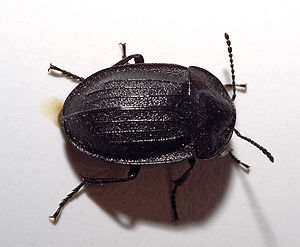Black snail hunter
| Black snail hunter | ||||||||||||
|---|---|---|---|---|---|---|---|---|---|---|---|---|

Black snail hunter ( Phosphuga atrata ) |
||||||||||||
| Systematics | ||||||||||||
|
||||||||||||
| Scientific name | ||||||||||||
| Phosphuga atrata | ||||||||||||
| ( Linnaeus , 1758) |
The black snail hunter or black carrion beetle ( Phosphuga atrata ) is a beetle from the family of carrion beetles (Silphidae).
features
The beetles grow to be 10 to 15 millimeters long and have a fairly flat and oval body. The basic color of the chitin carapace is black, younger specimens are brown, but there is also a light brown form ( f. Pedemontana ). On each of the two wings there are three protruding longitudinal ribs, the surface between them is wrinkled. The edge of the wing is slightly curved upwards. The head is elongated and clearly protruding from the rest of the body. The eleven-link antennae are half as long as the body, thread-like and are slightly thickened at the end. The last three links are finely haired.
Occurrence
The animals are very widespread in Europe and Asia east to Japan . To the north, its range extends beyond the Arctic Circle . They are often found in damp places, for example under leaves and loose bark and in moss .
Way of life
The beetles have a hidden way of life. Their flattened bodies allow them to crawl into narrow crevices. The animals hunt snails on the ground . In the case of limpets , their narrow, protruding heads can penetrate the shells if the snail has withdrawn in order to be able to kill them with a poisonous bite. The larvae are also black and flat; they too feed on snails. They pupate in the ground. When in danger, the beetles secrete a yellowish liquid and pull their heads back under the pronotum .
literature
- Karl Wilhelm Harde, Frantisek Severa and Edwin Möhn: The Kosmos Käferführer: The Central European Beetles. Franckh-Kosmos Verlags-GmbH & Co KG, Stuttgart 2000, ISBN 3-440-06959-1 .
- Jiří Zahradník : Beetles of Central and Northwestern Europe. An identification book for biologists and nature lovers. Parey, Hamburg et al. 1985, ISBN 3-490-27118-1 .
